- Updated On: October 2, 2024
On-Grid Vs Off-Grid Solar:
Which One is Right for You?
Choosing a solar panel system for your home, you’ll typically encounter two main options: off-grid and on-grid (also known as grid-tied) solar systems. Off-grid and on-grid solar systems differ in several ways, including power management, their installation costs, and the level of energy independence they provide. A recent study by the International Energy Agency (IEA), states that solar power will become the largest energy source by 2050.
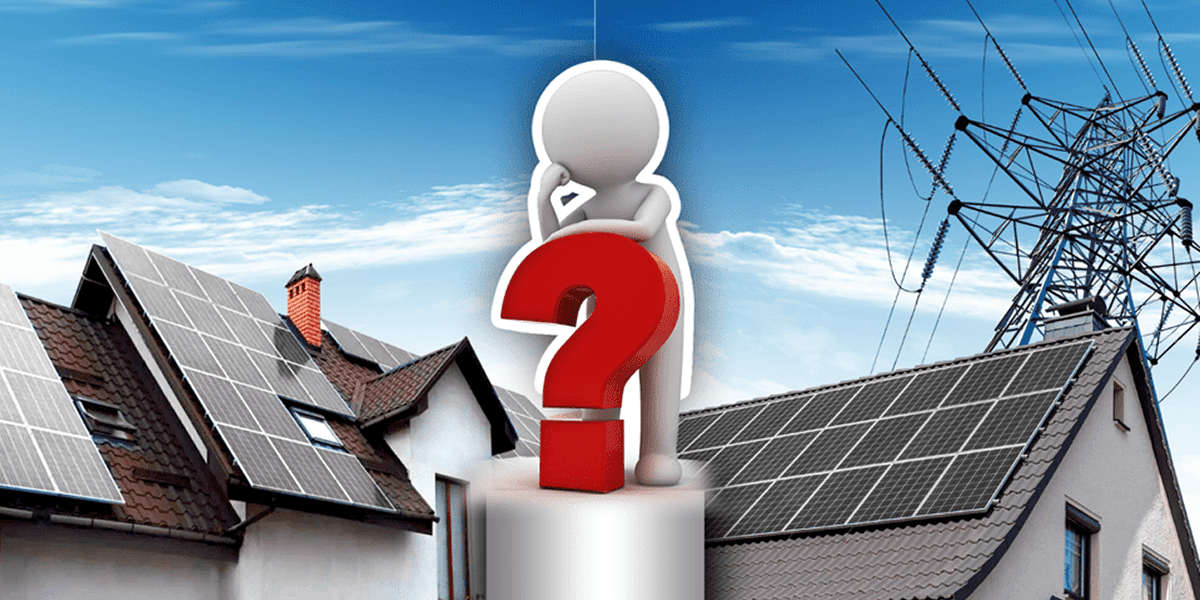
Understanding Off-Grid and On-Grid Solar System
Before we discuss the advantages and disadvantages of off-grid and on-grid solar systems, it’s important to develop a basic understanding of them. As the name suggests, a grid-tied or on-grid system requires a connection to the electrical grid. While an off-grid solar system operates independently with a battery backup for continuous energy.
Hence, it will definitely require your careful consideration to choose a solar system either off-grid and on-grid. Let’s dive in to have a detailed comparison of both systems:
Off-Grid Solar System
Off-grid systems are the independent systems, they have no connection with the power grid. These systems generate power from solar panels and store excess energy in batteries for later use.Off-grid systems require solar panels for power generation, batteries for energy storage, charge controllers and inverters to convert DC to usable AC power. Additionally, these systems can significantly reduce energy costs over time.
Off-grid systems are often ideal for homes in remote locations where access to the electric grid is unavailable. But it is also great for those who want to manage their energy consumption carefully, and do not wish to rely on external power sources.
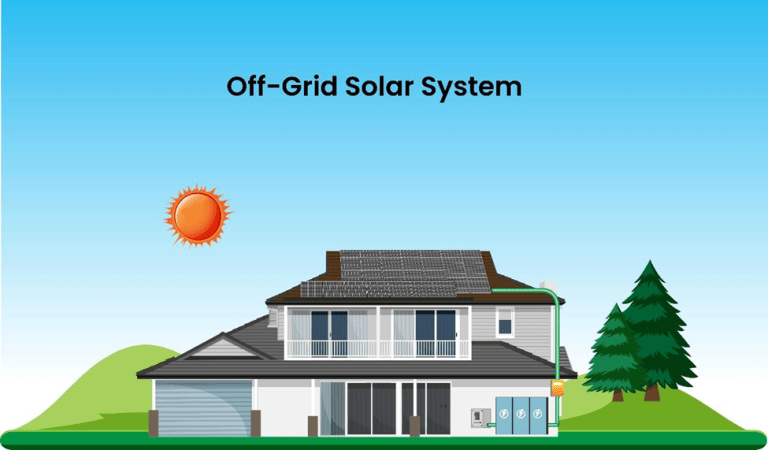
Pros of Off-Grid Solar System:
- Off-grid solar systems provide complete independence, and eliminate reliance on utility companies for electric supply.
- The off-grid solar system option also reduces your carbon footprint in comparison to conventional energy sources.
Cons of Off-Grid Solar System:
- Off-grid systems are costly, particularly due to the need for battery storage.
- During winter or prolonged cloudy periods, it may require careful energy management to avoid power shortages.
On-Grid or Grid-Tied Solar System
On the other hand, grid-connected solar power systems are tied to the electrical grid. This serves as an energy backup when solar production is low, such as at night or during cloudy days. Moreover, it also has the potential for cost-saving through net metering, enabling users to receive credits back for excess energy generated.
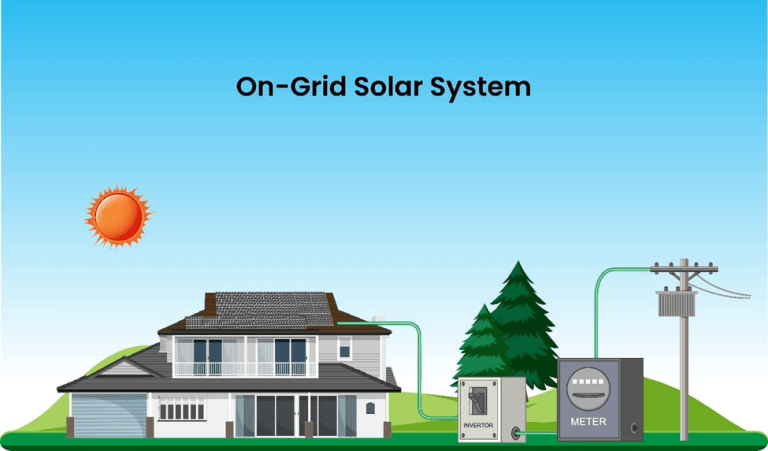
Often with Net metering in many areas, excess energy produced by your solar panels after consumption can be fed back to the electric grid. For instance, some of the best net metering policies can be found in California, New York and other states where customers are able to minimize and reduce their monthly electricity bills.
Other incentives that are available for solar energy users, include Solar Renewable Energy Credits or commonly referred to as SRECs. These tradable certificates reflect the environmental benefits of generating solar energy. You can earn one SREC for every megawatt-hour (MWh) of energy your solar system produces.
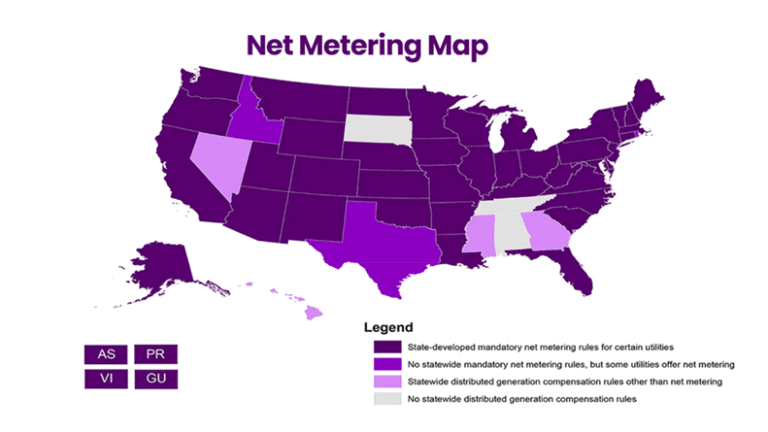
SRECs can be sold or traded to utilities and other entities to meet renewable energy standards which helps in reducing the cost of utilizing grid electricity. Overall, on-grid solar systems are less expensive than off-grid solar systems.
Cons of On-Grid Solar System:
- One of the major disadvantages of on-grid solar systems is that they rely completely on the electric grid. During a power outage, your system will also go down, leading to a loss of power unless you have battery storage to back it up.
- The grid-tied solar may help in decreasing the electricity cost. But you will still have to pay for the electricity consumption from the power grid.
Pros of On-Grid Solar System:
- A grid connected system is approximately 40% to 60% cheaper than an off-grid solar system of the same capacity.
- They are easier to install, and require less equipments.
Off-Grid and On-Grid Solar System: Key Differences
Off-grid and on-grid systems have distinct characteristics. When deciding between an off-grid or on-grid system, it’s important to consider the needs of your home. It includes multiple factors like your location, energy consumption, budget and future energy plans. Let’s take a look at few of them:
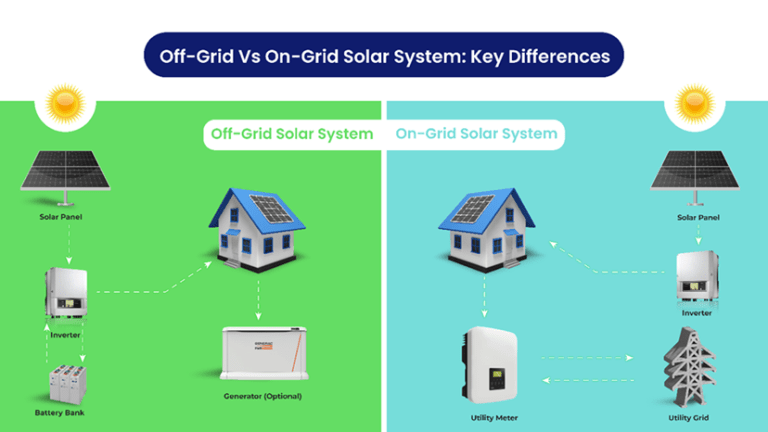
Off-Grid Vs On-Grid Energy Storage:
- Off-grid systems rely on batteries for energy storage; which is crucial for uninterrupted power in remote areas.
- On-grid systems use power grids as backup for nights and cloudy days, reducing the need for expensive energy storage options.
Off-Grid Vs On-Grid Reliability:
- Off-grid systems are not affected by grid outages. but they depend on consistent sunlight or careful storage management to work at night or cloudy days.
- On-grid systems will shut down during grid outages unless you equip them with a storage system such as a battery.
Off-Grid Vs On-Grid Cost:
- Off-grid systems have higher costs upfront, mainly due to battery expenses.
- On-grid systems are more cost-effective with lower initial cost, but lack of full energy independence.
Off-Grid Vs On-Grid Energy Independence:
- Off-grid systems provide complete grid independence, ideal for those who are living in rural or other remote locations.
- On-grid systems rely on the utility grid, backing you up at nights and cloudy weather.
Off-Grid vs On-Grid: Which one is right for you?
In conclusion, the decision to go for an off-grid or on-grid solar system completely depends upon your requirements and level of power independence. With comparatively higher installation cost, off-grid solar systems offer the advantage of full independence from traditional energy sources. While on-grid systems are more affordable and more convenient particularly because they allow net metering. That allows the excess power being produced by solar panels, fed back to the grid, and you earn credits back. You can save on your electricity bills.
Whether you choose off-grid or on-grid, you are investing in a reliable and sustainable energy solution. If you want an estimate of your future savings with a solar system and wish to choose the best option, whether off-grid or on-grid solar system, take advantage of our solar calculator to get a free quote today!
Related Articles:
One of America’s most effective solar incentives is net metering. It has driven the growth of residential solar with laws in over 40 states and U.S. territories.
If you have ever wondered how solar panels work you are not alone. People around the world have studied solar energy for nearly 200 years.
Net metering is also known as net energy metering (or NEM). It is a process that allows you to send extra energy generated by their solar panels system to the electrical grid and earn credits. However, the policies vary by state. Learn more about NEM states!



